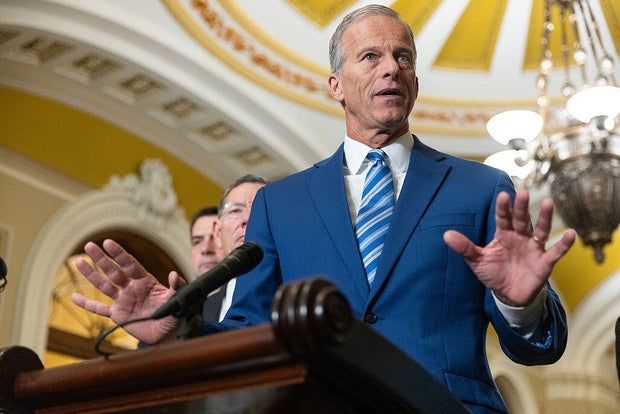Washington — The Senate is voting Thursday on advancing an individual year-long appropriations bill to fund the Pentagon as GOP leaders pursue an alternative approach to restart some funding as the government shutdown has stretched into a third week. But Democrats appear poised to block the measure.
Senate Majority Leader John Thune teed up consideration of the full-year Defense Department appropriations bill earlier this week, and the upper chamber is taking a procedural vote on advancing the measure Thursday afternoon.
The Senate has been locked in a stalemate in recent weeks, seeing no movement despite holding repeat votes on a short-term funding measure to reopen the government as Democrats demand an extension of expiring health insurance tax credits. The push to move forward with the Pentagon funding bill marks a change in approach as the shutdown wears on.
Because 60 votes are required to advance most legislation in the Senate, Republicans need support from across the aisle to reopen the government. And with 53 Republicans in the Senate, Democrat support will also be needed to advance the full-year Pentagon funding bill.
Senate Minority Leader Chuck Schumer indicated ahead of the vote Thursday that Democrats would oppose advancing the legislation. The New York Democrat told reporters at a news conference that “it’s always been unacceptable to Democrats to do the Defense bill without other bills that have so many things that are important to the American people, in terms of health care, in terms of housing, in terms of safety.”
Although Democrats have been at odds with Republicans over how to keep the government funded in the short term, they have generally been supportive of work on the regular appropriations process. But Schumer argued that “we have always negotiated these appropriations agreements in a bipartisan way,” and Republicans are now “just going at it alone.”
Each year, Congress must pass legislation to fund the government. But the process often stretched late into the fiscal year, forcing lawmakers to pass stopgap measures to keep the government funded while they continue work on the 12 full-year appropriations bills. In recent years, Congress has resorted to grouping the funding measures together into large packages, known as omnibus bills. Those are often considered at the last minute before a deadline, pressuring lawmakers to support them and fund the government. Still, GOP leadership in Congress has been pushing to return to the way the appropriations process is intended to play out, with individual funding bills.
Thune, a South Dakota Republican, encouraged Democrats earlier Thursday to allow the full-year Pentagon funding bill to advance, telling reporters that if Democrats “want to stop the Defense bill, I don’t think it’s very good optics for them.”
“They’ve got multiple opportunities to block it on the back end,” Thune said. “If I were them, I’d let us get on it, and then let’s see if we can add.”
Thune said lawmakers want to add appropriations for the Departments of Labor, Health and Human Services and Education, noting that a couple of other appropriations bills are available to wrap into a funding package as well. But doing so would require unanimous consent. Schumer said “they don’t have it” ahead of the vote.
The legislation would restore paychecks for members of the military, and it comes as President Trump directed the Pentagon to “use all available funds” to avoid service members missing their mid-month paychecks on Oct. 15. Still, the move hasn’t taken pressure off of lawmakers to reach a permanent solution, with Speaker Mike Johnson calling the administration’s move a “temporary fix.”

